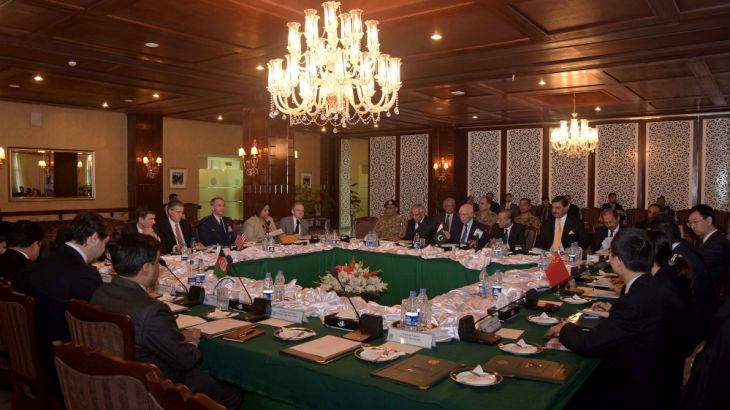Afghanistan peace talks held in Pakistan
Hopes pinned on negotiations, which also involve US and China, to lead to renewed efforts to engage the Taliban.

Talks aimed at kickstarting negotiations for a final peace settlement in Afghanistan have taken place in Pakistan, emphasising the need for a dialogue between the government and the Taliban.
Monday’s meeting – which also included the governments of the US and China – sought to revive the process that collapsed last summer after Afghanistan announced that Mullah Mohammad Omar, founder and leader of the Taliban, had died in a Pakistani hospital more than two years ago.
The announcement led the Taliban to pull out of the talks after just one meeting hosted by Islamabad.
|
|
The meeting in Islamabad emphasised the immediate need for direct talks between representatives of the Afghanistan government and representatives from Taliban groups in a peace process that aims to preserve Afghanistan’s unity, sovereignty and territorial integrity, said a joint statement released after the discussions.
The Quadrilateral Coordination Group – comprising representatives from Afghanistan, Pakistan, China and the US – is scheduled to meet in Kabul on January 18 “to hold discussions on a roadmap”, the statement added.
Meanwhile, a former Taliban senior official said that “military confrontation is not the solution” and that a “political solution” was needed to end the war in Afghanistan.
“The motivation for peace talks was very weak in the past,” Mohammad Hassan Haqyar said.
“But now the situation has changed and the Afghan government, America and Pakistan seem to have a readiness for dialogue.
“America has realised that a military confrontation is not the solution.”
Earlier, speaking at the meeting, Sartaj Aziz, a foreign affairs adviser to Pakistan’s prime minister, said that “the primary objective of the reconciliation process is to create conditions to bring the Taliban groups to the negotiation table and offer them incentives that can persuade them to move away from using violence as a tool for pursuing political goals”.
| Factors influencing peace talks |
|
Aziz added that neither preconditions nor threat of military action should be attached to the start of the negotiation process.
Attempts at peace talks have occurred in the past, but Al Jazeera’s Omar Al Saleh, reporting from Kabul, said: “What is different this time is that when the Pakistani army chief [General Raheel Sharif] came to Kabul last month, the two sides [Afghanistan and Pakistan] agreed that this time Pakistan would use force alongside the Afghan government against any Taliban members who oppose the peace talks.”
He identified several factors the parties must be taking into consideration, including what he called “the splinter within the Taliban”.
“The Taliban is not one united faction ever since the appointment of their new leader, Mullah Akhtar Mohammad Mansour,” he said.
ISIL phenomenon
This power struggle within the Taliban has raised questions about who would represent the group if and when the talks with the Afghan government restart.
A splinter group headed by Mullah Mohammad Rasool Akhund, which rejects Mansour’s authority, has dismissed any talks under the mediation of the US or China or of Pakistan.
“We have a very clear-cut stance about peace talks: all the foreign occupying forces would need to be withdrawn,” Mullah Abdul Manan Niazi, Rasool’s deputy, told Reuters on Monday.
“The issue is between the Afghans, and only the Afghans can resolve it. We would not allow any third force to mediate.”
Our correspondent also mentioned the emergence of the Islamic State of Iraq and the Levant (ISIL) group in eastern Afghanistan, which is fighting the Taliban.
“And, finally, the lack of confidence and trust between Pakistan and Afghanistan is a major issue, and they will try with the Americans and the Chinese to resolve these issues,” he said.
The Taliban has stepped up attacks since the United States and NATO formally ended their combat mission in Afghanistan a year ago, and the fighters are battling local Afghan security forces on several fronts.
OPINION: Afghanistan and the Taliban need Pakistan for peace
The group is expected to keep up the fight even if peace talks get off the ground in order to secure territory and improve their leverage in the negotiations.
When the Taliban opened their office in Qatar in June 2013, they outlined their two-pronged strategy of fighting and negotiating simultaneously.
It appears now that the group has made good its pledge, Al Jazeera’s Hashmat Moslih said.
“The Taliban have always made the [complete] withdrawal of foreign forces from Afghanistan as one of their main demands for peace,” he added.
“The group also wants constitutional reform with the word ‘sharia’ mentioned in the constitution.
“Since the Taliban is a predominantly Pashtun force, the main challenge is how to integrate the group into the national unity government without disturbing the delicate ethnic balance that has arguably been achieved.”
|
|